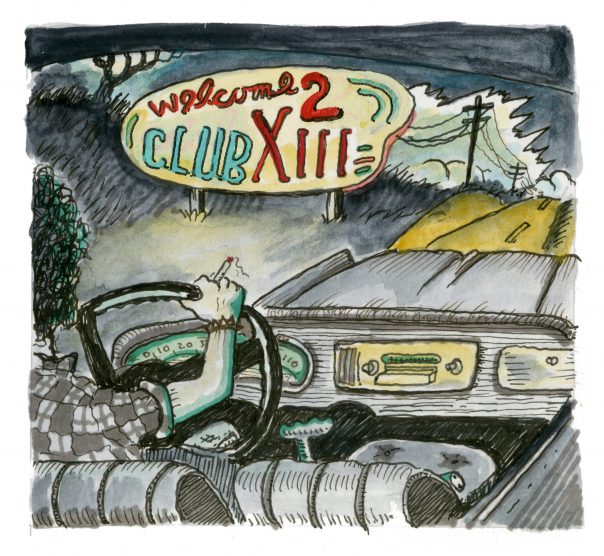REVIEW: Drive-By Truckers stay the course on ‘Welcome 2 Club XIII’

Drive-By Truckers, “Welcome 2 Club XIII.”
For most of Welcome 2 Club XIII, Drive-By Truckers drummer Brad Morgan lays down more or less the same steady, mid-tempo beat. One song rolls into the next, which rolls into the next and so on. It’s almost as if—as Neil Young once told someone who griped that his songs sounded the same—it’s all one song.
Welcome 2 Club XIII
Drive-By Truckers
ATO, June 3
9/10
In some ways, that holds especially true for the Truckers. Welcome 2 Club XIII constitutes another chapter in the Southern rockers’ three-decade examination of folks struggling to get by in America. If it doesn’t rock as hard as some of the earlier chapters—say, 2004’s The Dirty South or 2014’s English Oceans—rocking out isn’t really the point. Instead, the point is endurance; it’s about finding the strength to keep going no matter how rough the road gets.
That’s why Morgan’s beat is key: It embodies that resolve to stay the course. At the same time, the solidly constructed tunes and the vivid, trenchant lyrics offer ample proof that the Drive-By Truckers are still one of the best modern American rock bands.
Welcome 2 Club XIII’s opener, the seven-minute “The Driver,” is a perfect case in point, with lead singer-songwriter Patterson Hood relating a series of driving-related memories in a crinkled, raspy monotone. These range from the sinister (passing by a Klan rally) to the shocking (seeing a car full of girls fly off a highway) to the sublime (soaking up the beauty of the landscape on his first cross-country tour). “There’s this alternate reality where everything is different/ Than the world of happy endings we endure,” Hood intones. The steadfast beat and the menacing minor-key riff hint that the next glimpse of that reality could be around the next bend.
Co-bandleader Mike Cooley takes the mic on “Maria’s Awful Disclosure,” a rumination on a salaciously gruesome anti-Catholic book published in 1836. If you wonder why Cooley’s so fixated on this historical curio, do a quick read-up on the book’s sordid history. It’s all too easy to draw parallels between the nativist hysteria of that time and the QAnon/rigged-election lunacy of today.
The mellow “Shake and Pine” finds Hood reflecting on how certainties and comforts can slip away from us as we get older. “It’d be so sublime/ To step out of the shadow/ And walk toward the sun,” he sings. The twang of the guitars echoes this yearning while the soft keyboard chords lend a hopeful glow to the track.
The mood turns darker on “We Will Never Wake You Up in the Morning,” a mournful look at a friend who gave up on life and lost himself in booze and drugs. As Hood describes the friend’s decline, his words and voice have little of the anger or bitterness that they might have had in his younger days. It’s as if he’s felt too much despair himself to judge the guy too harshly. Even the metronomic one-two of Morgan’s drumming seems to shrug and say, “What can you do?” Meanwhile, the keening pedal steel underscores the sadness of the whole situation.
Next up is the funny, swinging title track, which fondly but unsentimentally recalls the crappy dive bar where Hood and Cooley cut their teeth as musicians. Details like “our favorite Foghat cover band,” the penny beer, and “girls warmed up by tanning beds” support Hood’s wry summation: “Our glory days did kinda suck.”
The heartwarming “Forged in Hell and Heaven Sent” finds Hood catching up with a buddy from those Club XIII days. Time has taken its toll on them both, but Hood’s joy is palpable as he reflects on their transition from hellraisers to husbands and fathers. Cooley steps up to the mic again for “Every Single Storied Flameout,” dissecting the damage done by hard rock’s live-fast-die-young ethos.
On “Billy Ringo in the Dark,” Hood casts an empathic, supportive eye on another friend whose dreams didn’t pan out. Fans may recall Billy Ringo from the song “Better Than the Truth,” off Hood’s 2012 solo album, Heat Lightning Rumbles in the Distance. While Ringo’s more of a comic figure in the earlier tune, his daily struggles have a dignity—even a nobility—here.
On Club XIII’s closer, “Wilder Days,” Hood meditates once more on the disillusionments of maturity. As Morgan’s drums march dutifully on, he sings, “There’s no comfort in survival, but it’s still the best option that I’ve found.”
Follow reporter Ben Schultz at Instagram.com/benjamin.schultz1.
